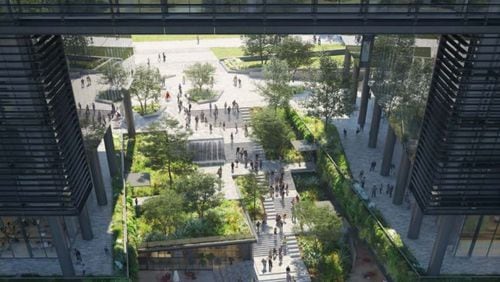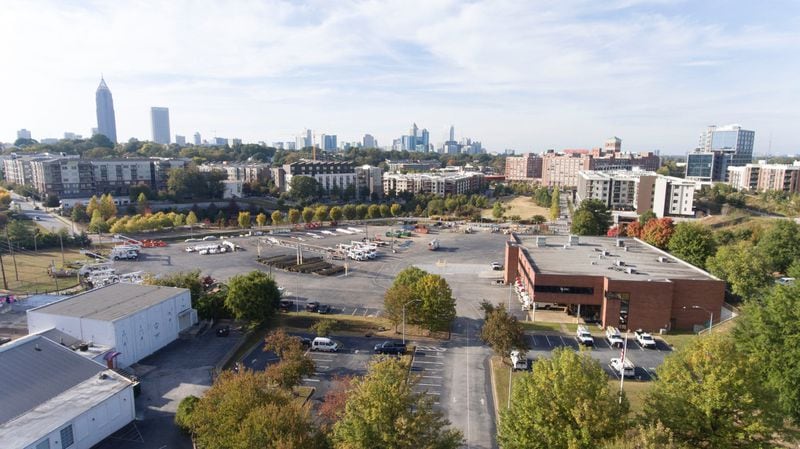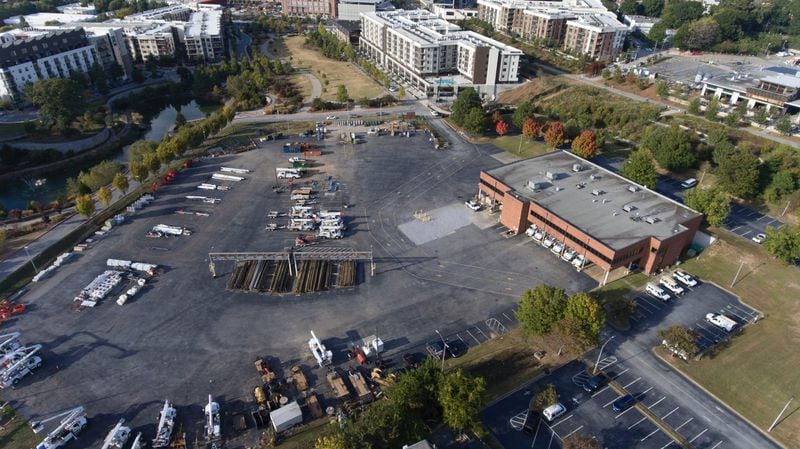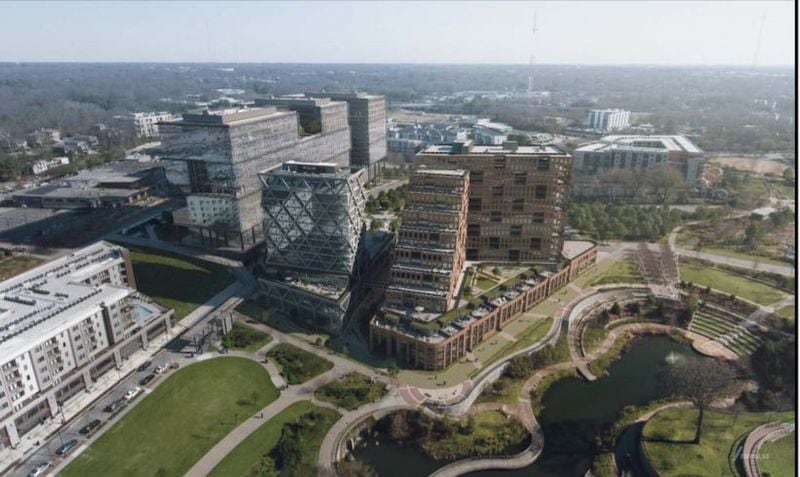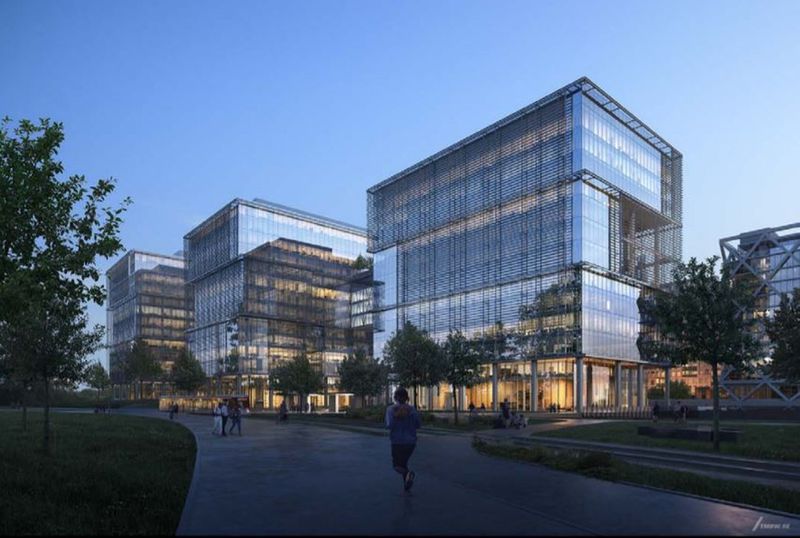An Atlanta agency on Thursday will consider granting more than $22.5 million in tax breaks for a posh development on a coveted stretch of the Beltline.
Critics say the money would be better-spent on the city's affordable housing crunch or invested in future transit services along the trail network.
“It’s absolutely outrageous,” said former Atlanta City Council President Cathy Woolard, who helped create the Beltline and advocates for promised rail transit on the 22-mile trail network. “If you can’t make money on development on the Beltline you need to get out of the business.”
Atlanta-based developer New City Properties has proposed 1,100 residences, more than 1 million square feet of office space, 200,000 square feet of retail and a 75-room hotel on a former Georgia Power yard along Ralph McGill Boulevard, overlooking Historic Fourth Ward Park and Ponce City Market.
The board of Invest Atlanta, the city’s development agency, will consider the tax breaks for phase one of the project, which is slated for 350 apartments and about 475,000 square feet of office space.
The tax break, known as an abatement, is a rare move for a project along the Beltline. Woolard and other critics say it flies in the face of how the project was envisioned. That’s because the Beltline is supposed to largely pay for itself using future tax revenue generated by new development and appreciating property values.
When the city founded the Beltline, it created a special taxing district that’s designed to direct long-term gains in property taxes into the trails, parks, future transit and affordable housing.
New City President Jim Irwin said the property generates little tax revenue now. After development, the site will improve surrounding infrastructure and generate about $60 million in new tax revenue over 10 years, after factoring in the tax break. Most of the incentive will go to tenants whom he said will create jobs.
“The vast majority of this incentive is being used as an economic development tool,” he said.
The use of incentives has come under increasing scrutiny by taxpayers who fear government officials dole out far more than the value of public benefits.
Last year, the city approved an unprecedented incentive package valued at up to $1.9 billion for redevelopment of downtown's forlorn Gulch. Taxpayers also have been angered by recent audits that show commercial property values in Fulton County are valued far less for tax purposes than recent sales, meaning more of the tax burden falls on homeowners.
“One of the big criticisms is if these are such a win-win, you should be able to finance (incentives) with upfront cash grants, and if you can’t, you shouldn’t do it,” said Nathan Jensen, a professor who studies incentives, at the University of Texas at Austin.
‘Breach of promise’
New City won an earlier tax abatement for 725 Ponce, an office tower and Kroger store on the Beltline that just opened. The $7.4 million tax break defied Invest Atlanta's prior practice of not granting the incentive for Beltline projects. The Beltline, a separate agency, supported the tax break because, despite the incentive, the overall tax base increased substantially, Irwin said.
Since then, the Development Authority of Fulton County granted a similar subsidy for a nearby luxury hotel.
David Sjoquist, a Georgia State University professor who specializes in state and local government taxation, said incentives are best used to spur businesses to address civic needs, such as affordable housing, or to develop in overlooked areas starved for investment.
The Old Fourth Ward is now a hot residential and corporate address, attracting companies like BlackRock and Mailchimp.
You couldn’t say that 20 years ago, said Sjoquist.
“The market is strong enough that you don’t need to provide incentives to build there,” he said.
In exchange for the tax breaks, New City has proposed building infrastructure it says is valued at $20 million, including a public plaza for tenants and the community. A grand staircase with water feature and dedicated bicycle bridge will connect the park and the Beltline through the development.
New City also proposes fashioning surrounding streets into an improved grid and converting Dallas Street into a bike and pedestrian path into the park.
Per city code, 35 apartments, or 10% of first phase units, would be reserved for households who earn 60% of the area median income. But most tax savings will be passed along to office tenants and retailers, Irwin said.
Julian Bene, a former Invest Atlanta board member, called the proposal “daft.” A skilled developer would want to tie his project into the Beltline anyway, he said, and the road improvements benefit the developer as much as the public.
A claim in an Invest Atlanta fact sheet that the project will create 2,400 permanent jobs, Bene said, is ludicrous. Tenants would create jobs, not the project. Often developers poach companies from other parts of the region, Bene said, meaning taxpayers would subsidize shuffling workers around the city.
Irwin said companies relocating within the region aren’t restricted from receiving the tax benefits.
“The damned TAD is supposed to get the revenues,” Bene said. “That’s how this works. If you start abating (taxes), it’s really a breach of promise. The public has forked out a fortune to redevelop that area and these guys aren’t going to pay their fair share.”
Properties undervalued
Last year, The Atlanta Journal-Constitution and Channel 2 Action News found Fulton County dramatically undervalued dozens of commercial properties in Atlanta compared to prices they fetched in recent sales.
The findings suggest that the city’s schools and local governments miss out on on tens or even hundreds of millions of dollars in revenue. Critics say that shifts the burden to smaller businesses and homeowners to pay for vital services.
An examination of 264 multimillion-dollar commercial property sales since 2015 found about 175 — or two-thirds — sold for at least 50% more than the county said they were worth that same year.
One of those properties was the Georgia Power site, which an affiliate of New City bought in October 2017.
New City spent $34 million for the property. A year later, Fulton County valued it for tax purposes at a mere $4.9 million.
WHAT IS A TAD?
A tax allocation district, or TAD, is a powerful development incentive used to help fund major projects like the Atlanta Beltline and Atlantic Station. TADs are areas where property tax collections are frozen for a period of time, and future increases in tax collections from rising property values as the area redevelops are used to help pay for the development. In theory, after the bonds are repaid, the participating government bodies such as school systems reap the financial benefit of new, higher property values.

